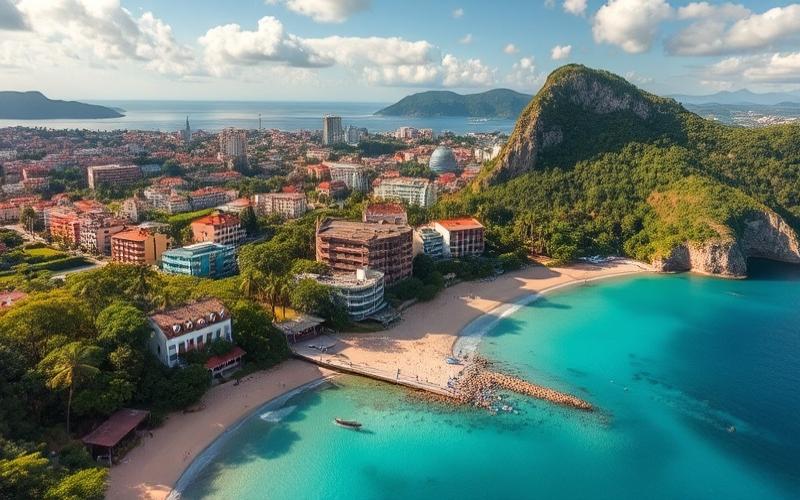
 Published on and written by Cyril Jarnias
Published on and written by Cyril Jarnias
Family law in Brazil presents a complex and constantly evolving landscape, reflecting the country’s unique social and cultural dynamics. Among the most discussed aspects, the issues of adoption and divorce stand out for their significant impact on the lives of Brazilian families.
Adoption, governed by laws aimed at protecting child welfare, comes with unique bureaucratic and ethical challenges in this vast nation. Divorce, meanwhile, reflects societal transformations and efforts to modernize a once rigid system.
This article explores these two dimensions of Brazilian family law, highlighting recent developments and key concerns that shape family daily life, while offering in-depth reflection on the legal and social implications of these often complex processes.
Understanding Family Law in Brazil
Family law in Brazil is based on strong constitutional principles, stemming from the country’s historical evolution and profoundly reformed since the late 20th century. It aims to guarantee equality, protection of human dignity, and diversity of family structures.
Origins and Historical Evolution
- During the colonial and imperial periods, family law was strongly patriarchal, centered on legitimate marriage and the authority of the head of household.
- The 1916 Civil Code reflected this model, maintaining inequalities between men and women and discriminating against children born out of wedlock.
- The 1988 Federal Constitution marked a turning point: it recognizes the plurality of family models (marriage, common-law unions, single-parent families, adoptive families), establishes equality between spouses and children, and prohibits any discrimination based on parentage or family form.
- The new 2002 Civil Code completes this transformation by integrating constitutional principles of equality and human dignity.
Main Laws and Regulations
| Area | Main Current Regulations |
|---|---|
| Marriage | Civil Code (arts. 1,511 to 1,590) |
| Divorce | Constitution (art. 226 §6), Civil Code, Law 11,441/2007 |
| Child Custody | Civil Code (arts. 1,583 to 1,590), Child and Adolescent Statute |
| Adoption | Child and Adolescent Statute (Law 8,069/1990, arts. 39 to 52) |
- Marriage allows for name changes, with the possibility to keep or remove it in case of divorce.
- The law recognizes equal rights and duties between spouses and protects children, whether from marriage, common-law union, or adoption.
Particularities of the Brazilian System
- Constitutionalization of Private Law: Constitutional principles (equality, dignity, non-discrimination) take precedence over classical civil rules.
- Recognition of Common-Law Unions and Same-Sex Families: Brazil has expanded the concept of family, notably through the STF ruling ADI 4,277/DF (2011), which recognizes the legitimacy of families formed by same-sex couples.
- Flexibility of Name Changes: The system allows any person to request a name change for legitimate interest, subject to court approval.
Recent Reforms and Current Debates
- The facilitation of extrajudicial divorce (Law 11,441/2007) simplified separation procedures.
- Current debates focus particularly on expanding rights for blended families and socio-affective parenting, surrogacy, and enhanced protection against family violence.
- Court decisions continue to broaden recognition of different forms of parenthood and filiation.
Practical Examples and Case Studies
- A divorced woman can keep her ex-spouse’s name or return to her original name, according to her will and the judge’s assessment.
- A same-sex couple can adopt a child and have this parentage fully recognized by the state, enjoying the same rights as heterosexual couples.
- In separations, shared custody (alternating custody) is encouraged, but the child’s best interest remains the priority. Judges can adapt custody according to the child’s specific needs and each parent’s educational capacity.
- In adoption cases, the procedure guarantees equal treatment for all children, whether biological or adopted, without discrimination.
Key Takeaways
Brazilian family law is distinguished by its strong constitutional imprint, equality among family members, and inclusion of diverse family models, with active jurisprudence that continuously adapts legislation to social changes.
Good to Know:
Family law in Brazil is anchored in the 2002 Civil Code, governing marriage, divorce, and adoption, while drawing on recent reforms that promote spousal equality and child protection, contrasting with the predominantly Anglo-Saxon model of other countries. A local particularity is the legal recognition of stable unions, which grants rights similar to marriage and plays a key role in establishing child custody in case of separation.
Adoption Procedures for Expatriates
Specific Legal Requirements for Expatriates
- Expatriates wishing to adopt a Brazilian child must go through the central authority for international adoption in their country of residence.
- Adoption is open to married couples (including same-sex), single individuals, and there is no minimum marriage duration required.
- The minimum age for adoptive parents is 18 years.
- A residence permit in Brazil is necessary during the procedure: residing at least 30 days in the country with the child is required before adoption is granted by the local court.
Verification and Qualification Process
- Brazilian adoption agencies (CEJA or CEJAI depending on the state) conduct a complete file verification and candidate qualification.
- The procedure includes:
- Analysis of the complete file, including psychological, social, and financial evaluations.
- Interview(s) with Brazilian social services.
- Verification of family integration during the mandatory stay with the child.
Coordination with Home Country Authorities
- The central authority of the home country must:
- Validate candidate suitability to adopt according to their country’s criteria.
- Provide official documents (certificates, evaluations, reports) translated into Portuguese by a sworn translator and apostilled.
- Ensure post-adoption follow-up through regular reports on the child’s integration and development (1 report every 6 months for 2 years).
Influence of International Agreements
| International Agreement | Impact on Procedure |
|---|---|
| 1993 Hague Convention | Guarantees regularity, child protection, cooperation |
| 1980 Hague Convention | Manages civil aspects of international child abduction |
| 1989 Inter-American Convention | International return of children |
Examples of Required Documents
- Psychosocial evaluation
- Detailed financial report
- Adoptive parents’ criminal record
- Adoptive parents’ medical certificate
- Birth and marriage certificates (translated and apostilled)
- Proof of residence
- Handwritten motivation letter
- Post-adoption follow-up commitment
Potential Challenges for Expatriates
- Language Barriers: All documents must be translated into Portuguese by a sworn translator.
- Cultural Differences: Brazilian social services’ expectations may differ from those of the home country.
- Administrative Complexity: Multiple authorities involved (local, federal, international).
- Variable Timelines: Dependent on the child profile sought and the federated state.
- Mandatory Extended Stay: Requires logistical and professional planning.
Available Assistance Services
- Support from accredited adoption agencies
- Assistance from consular authorities of the home country
- Help from sworn translators for file preparation
- Adoptive family associations and support networks for practical advice and moral support
Good to Know:
Expatriates must obtain a residence permit to adopt in Brazil, follow a rigorous verification process by local agencies, and ensure their home country recognizes the Hague Convention; be aware of language barriers, specialized legal assistance may be necessary.
International adoption in Brazil is strictly regulated by Brazilian law and international conventions: professional guidance and meticulous preparation are essential to succeed in each step of the process.
Expatriate Divorce: Steps and Considerations
To divorce in Brazil as an expatriate, one must follow precise legal steps, respect Brazilian court jurisdiction conditions, and consider specific aspects of local family law.
Legal Steps to Initiate and Finalize Divorce in Brazil (Expatriates)
1. Verification of Brazilian Court Jurisdiction
Divorce is possible if the marriage was celebrated in Brazil or if a marriage celebrated abroad was registered in Brazil.
If the marriage was not registered in Brazil, it’s possible to register it retroactively before starting divorce proceedings. Each situation requires individual analysis.
2. Residence Conditions
Brazilian court jurisdiction can be recognized if one spouse is domiciled in Brazil or if shared property is located there.
3. Choice of Procedure Type
Consensual divorce: total agreement on the dissolution and its consequences (can be done before a notary if no minor children, otherwise before a judge).
Contentious divorce: in case of disagreement, the procedure takes place before a judge.
4. Document Collection
Marriage certificate (Brazilian or registered in Brazil).
Identification documents.
Proof of residence.
For foreign documents: legalization (apostille or consulate), then official translation by a sworn translator (tradutor juramentado).
5. Legal Representation
Representation by a Brazilian lawyer is mandatory for any court procedure.
6. Homologation of Foreign Divorces
If divorce was granted abroad, it must be homologated by the Superior Tribunal de Justiça (STJ) to take effect in Brazil, especially if the decision concerns custody, property division, or alimony.
Summary of Procedural Steps
| Step | Detail |
|---|---|
| Jurisdiction Verification | Marriage celebrated/registered in Brazil, or prior registration required |
| Document Collection & Legalization | Apostille/legalization + official translation |
| Representation | Brazilian lawyer mandatory |
| Filing Petition | Before notary (simple cases) or judge (if minor children/disagreement) |
| STJ Homologation (if foreign divorce) | Mandatory if custody, assets, or alimony involved |
Particularities of Brazilian Family Law for Expatriates
Marital Regimes: Brazil recognizes the property regime chosen at marriage, including those concluded abroad, but application to assets located in Brazil depends on local rules.
Recognition of Foreign Assets: Division of assets located abroad may require separate proceedings in the country where the assets are located, as Brazilian decisions are not automatically recognized there.
Child Custody: Decisions concerning custody must respect the child’s best interest. If custody is decided abroad, homologation by the STJ is mandatory to take effect in Brazil.
Alimony: Foreign decisions are also subject to homologation to be enforced in Brazil.
Tax Considerations
Property division may have tax consequences, particularly regarding transfer tax or capital gains on assets located in Brazil.
Taxation applicable to expatriates varies according to the parties’ tax residence and asset location.
Official Translations
All documents written in foreign languages must be translated into Portuguese by a sworn translator recognized in Brazil (tradutor juramentado).
Translation is indispensable for any judicial or administrative procedure.
International Recognition of Brazilian Divorce
A divorce granted in Brazil does not automatically take effect abroad.
It’s often necessary to have the Brazilian decision recognized in the home country through a recognition or exequatur procedure.
Rules vary depending on the concerned country, particularly in the European Union or North America.
Resources Available for Expatriates
Lawyers Specialized in Private International Law: To guide the procedure, ensure compliance, and anticipate effects abroad.
Consular Services: Information on procedures, apostille, document legalization, assistance with administrative difficulties.
Sworn Translators: Essential for official document translation.
Notaries: For consensual divorces without minor children, allowing for faster procedures.
Essential Points to Remember
Validation (homologation) of a foreign divorce in Brazil is imperative for any civil status modification, property division, alimony enforcement, or child custody.
The procedure involves strict requirements for translation, legalization, and legal representation.
It’s advisable to use specialized professionals to anticipate cross-border complexities, particularly for divorce recognition in the home country.
A divorce granted abroad has no legal effect in Brazil without homologation by the STJ, and conversely, a Brazilian divorce must be recognized in the home country to have international effects.
Good to Know:
Expatriates must reside at least one year in Brazil for Brazilian courts to have jurisdiction over their divorce, while assets acquired abroad must be declared for equitable division. Official document translations and consultation with international law specialists are essential to avoid complications, and a divorce granted in Brazil may not be automatically recognized in the home country, sometimes requiring additional steps.
Disclaimer: The information provided on this website is for informational purposes only and does not constitute financial, legal, or professional advice. We encourage you to consult qualified experts before making any investment, real estate, or expatriation decisions. Although we strive to maintain up-to-date and accurate information, we do not guarantee the completeness, accuracy, or timeliness of the proposed content. As investment and expatriation involve risks, we disclaim any liability for potential losses or damages arising from the use of this site. Your use of this site confirms your acceptance of these terms and your understanding of the associated risks.


























































